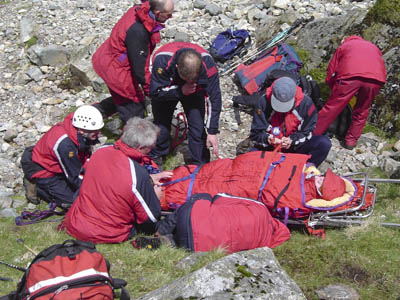 Britain has a proud tradition of mountain and fell rescue, free of charge and professionally delivered – yet provided by unpaid volunteers.
Britain has a proud tradition of mountain and fell rescue, free of charge and professionally delivered – yet provided by unpaid volunteers.
A mountain rescue team at work in the Lake District
That could change. The unthinkable is being thought: that mountain rescue teams (MRTs) might have to charge for their services. The reason: the charities that operate rescue in this country are being stretched to their limit by an unprecedented increase in calls for help.
One major reason for the impending crisis is the growing tendency for hillwalkers, who account for nearly 80 per cent of MRT incidents, to call for rescue when they get lost. They are, in effect, asking for a free guiding service. And the teams are not happy.
Earlier this month, leaders from MRTs throughout England, Wales and Scotland met in the Cumbrian town of Keswick and high on the agenda was how to tackle this problem. Richard Warren, regional secretary of the Lakeland rescuers and a member of the Wasdale team, told grough: “A significant increase in non-life-threatening rescues will compromise a mountain rescue team’s ability to respond to more serious incidents.”
The crux of the problem is that hillwalkers seem to be heading for the fells and mountains ill prepared and without planning. They overstretch themselves and find they can’t complete a route before becoming benighted. And with the ubiquity of the mobile phone, help is just three presses of the number nine button away.
This is causing a major headache for the rescuers. 30 parties on the fells in the Wasdale area called for assistance to get themselves off the mountains. They weren’t injured; they were simply lost. Only five of the groups were prepared to chance making their own way to safety with phone guidance from the MRT. The rest had to be searched for, found and walked off the fell.
Mr Warren continued: “Since the beginning of 2007, the Lake District has seen a steady increase in the number of callouts. It started to be noticeable in the spring: three rescues in one day on one of our region’s areas and by the end of April the same team, Wasdale, had attended 24 incidents, 50 per cent up on the previous year.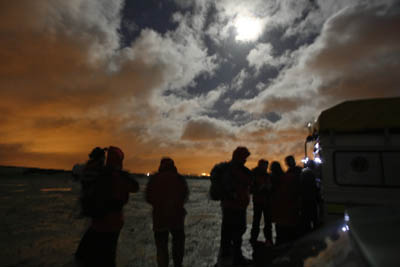
“Many of these rescues were down to the Three Peaks Challenge [in which walkers attempt to summit Ben Nevis, Scafell Pike and Snowdon in 24 hours] which, by then, had brought the total number of 999 calls for assistance to 85. By mid November, the Wasdale Team had taken 103 calls from the police and of these, 73 had required significant team effort on the mountains.”
Mr Warren believes the problem will get worse unless national action is taken to get the message across to walkers that they need to be self-sufficient on the hills.
The leaders’ meeting looked at three possible solutions. One was to send an invoice after a callout. The Langdale and Ambleside team had produced what was termed a ‘humorous example’ but Mr Warren said it was ‘a light-hearted approach but a hint of reality and possible glimpse of the future’.
The second idea was: if a group on the fells needed a guide to get them off the mountain, then the rescue teams should give them the number of a local mountain guide in the first instance. Imagine the concentration of the mind that would induce, at the thought of having to wait for a guide to kit him or herself up and demand payment for a night hike down to the valley.
Third, and a definite runner, was a campaign to raise public awareness about how mountain rescue works, with the aim of reducing the number of ‘guiding’ callouts. Walkers, and climbers, need to know a little more about the outdoors, the risks, what mountain rescue is and what it is not.
Wasdale is not the only Lakes team to experience this problem. Half of Cockermouth team’s incidents in a 12-week period at the end of summer were for what Mr Warren describes as ‘wandering aimlessly’ or for a guiding service when ill prepared or ill equipped. This summer, Langdale and Ambleside MRT appealed for walkers to ‘get some balls’ and get themselves out of trouble.
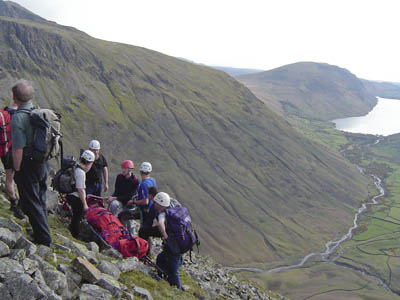 The latest report from Mountain Rescue (England and Wales), the umbrella organisation for teams south of the border, says nearly a thousand people were assisted in 2006, an increase of 12 per cent on the previous year.
The latest report from Mountain Rescue (England and Wales), the umbrella organisation for teams south of the border, says nearly a thousand people were assisted in 2006, an increase of 12 per cent on the previous year.
Wasdale MRT carries out a rescue
Ged Feeney, statistics officer for the body, said: “An increase has been noticed in the number of incidents attributed to poor navigation and/or preparation. Incidents reported as lost, benighted or overdue currently account for one in four mountain incidents.”
Similar problems occur north of the border. A research study by Dr Bob Sharp, commissioned by sportscotland, found that navigation was the most commonly cited cause of all incidents, nearly a quarter of the total, closely followed by bad planning (18 per cent) and inadequate equipment (11 per cent). Members of clubs, youth groups and charity groups were getting lost proportionately more than any other group.
Next year, the mountain rescue movement in Britain celebrates its 75th anniversary. Teams hope to use the landmark to start a national campaign of education for walkers and climbers on the country’s high ground. Hillwalking has been growing in popularity and there is, perhaps, a perception among some of the newer converts to the pastime that it is without risks.
Much of the outdoor media, including this website, encourages the widest possible use of our great mountain areas. There is, moreover, a prevalent gung-ho approach among some writers which emphasises the anything-is-possible outlook while understating the risks. It has to be said: mountains and fells can be dangerous. Don’t think you can rely on someone else to get you out of trouble. Our own routes state that a good degree of knowledge in navigation is essential if undertaking difficult walks.
Reliance on mobile phones and GPS receivers is risky. They are prone to failure and can lead to an ill founded sense of security. A map and compass, and the knowledge of how to use them, will not fail the hillwalker.
Thirty-two people lost their lives on the hills of England and Wales last year. If it weren’t for the hundreds of volunteers who leave their homes and families week after week to go to the aid of mountaineers, there would be even more fatalities.
The mountain education campaign will kick off in the New Year. Cumbria Tourism is backing the programme and it is hoped sponsorship will be forthcoming. The Lakes teams are also seeking the backing of Cumbria Constabulary. The MRTs are also teaming up with Where-Wolf, a company which produces a little gadget to make it easier to give an accurate grid reference. Where-Wolf is donating 10 per cent of all its pre-Christmas sales to Mountain Rescue (England and Wales). There are also plans to produce an MRT-branded version of the plastic card early next year. The rescue teams hope to have a ‘how to help yourself’ plastic card ready later in the year.
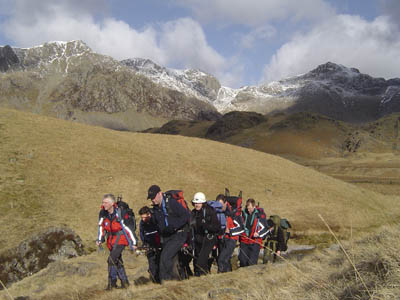 The message will be reinforced at a Spring event at Rheged, near Penrith, which will celebrate mountain rescue’s anniversary.
The message will be reinforced at a Spring event at Rheged, near Penrith, which will celebrate mountain rescue’s anniversary.
A casualty is carried off the fells
In the meantime: don’t become another embarrassing MRT statistic. Learn to map read and always take a torch on to the fells. Tiny emergency headlights can now be bought which take up hardly any room in your rucksack and weigh less than a sandwich. Ask Santa for one if you haven’t already got one.
The mountain rescue advice is fairly common-sense, but is worth remembering (or print it out):
- Plan ahead: consider equipment, experience, capabilities and enthusiasm
- Get a weather forecast (see our link on the left-hand menu)
- Learn basic first-aid
- Be careful towards the end of the day. Charge up phone batteries before your trip
- Wear suitable footwear and clothing and take some spare warm clothes
- Have an emergency food supply, such as chocolate or dates, in addition to your planned food
- If you run out of water, fast-running hill streams on stony beds are usually safe
- Take a map, compass and a watch and know how to use them to navigate
- If you have a GPS, know at least how to give your position (a fix) to MRTs
- Always carry a whistle, torch, and spare batteries. In winter, an ice-axe, crampons and survival bag are essential
- Climbers and bikers should wear helmets
- Party leaders should not allow groups to become separated
- Take special care of young and weak party members
- If going alone, leave a note of your route. Notify any changes if you divert from the route
- Be prepared to turn back
- If you have a serious problem, ring 999 and ask for the police, who will mobilise mountain rescue
- If you don’t have phone contact, use six whistle blasts or torch flashes, repeated with a minute’s gap, to attract attention
- Don’t rely on mobile phone coverage. Signals are often weak or non-existent in mountain areas. If you do make contact with mountain rescue, keep your phone turned on
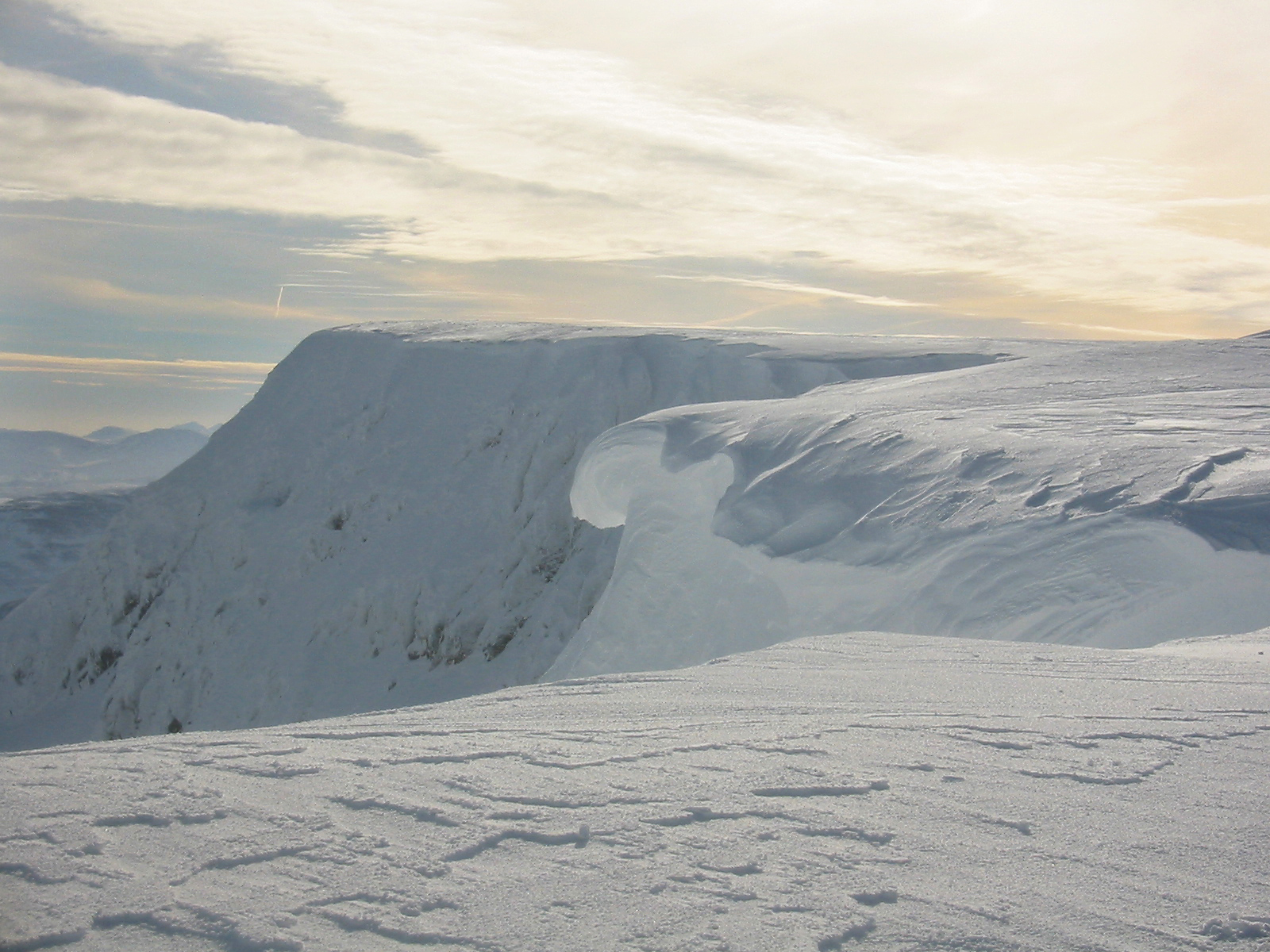
- Be aware of dangerous terrain: precipices; steep snow and ice slopes; steep grass slopes; unstable boulders; streams in spate; gullies and gorges; snow cornices
- Be wary of exceeding your experience and ability and realise your concentration may wane at the end of the day
- Be prepared to swallow your pride: turn back if necessary, and be governed by the weakest party member.
• Keep an eye on the following: weather changes; iced-up paths; excessive cold and heat – adjust your clothing appropriately; the onset of exhaustion – keep warm and rest; illness or accident – don’t panic, make sure rescuers know exactly where you are; passage of time, especially under pressure – winter daylight hours are short
And if, despite all that, you should find yourself panicked on the fellside, unsure of where you are, just remember before you pull out your mobile: every member of our volunteer mountain rescue service has a home life, a day job, and probably aching limbs from yesterday’s callout. Check those contours, get your compass out and make a real effort to rescue yourself before you hit 999.
Mountain Rescue (England and Wales)
Mountain Rescue Committee of Scotland
Irish Mountain Rescue Association
Andy
16 December 2007"if a group on the fells needed a guide to get them off the mountain, then the rescue teams should give them the number of a local mountain guide in the first instance." - An EXCELLENT idea. IMPLEMENT this IMMEDIATELY!
Bo Taylor
17 December 2007We have also had similar experiences when out hillwalking-finding three people in thick mist with no map,compass or proper clothing shouting into the gloom .They seemed quite happy to ruin our day as we had to abort our own plans to lead them off the mountain.The mountain guide idea sounds great .Having to pay if lost should concentrate the mind.Perhaps the MRTs could also get the message over via local TV news programmes with suitable anecdotes.
Tim
17 December 2007It's a good idea, BUT, how long before people stop phoning in "lost" and start phoning in with a "twisted ankle"? It could become very difficult for the MRT teams to differentiate. I think Julia Bradbury and the BBC deserve to take some stick over this, as she flounced around the hills with barely a glance at an OS map.
Richard Warren - Lakes District
18 December 2007Some good views - keep them coming . re Tim's comment - you might want to take a look at the rescue we had to do last night - driver who dialled '999' reporting breathless and marooned on the Hardknott Pass due to ice. Did he need MRT as a medical emergency? No, when we got to him with oxygen and defib he was fine - just stuck along with another driver. They did not even offer to send a contribution to team funds - perhaps I missed a trick and should have explained we are volunteers
Chris
18 December 2007I can only remember 1 program and that only ran for a short time on the BBC about a Mountain Rescue team .Why not flood the media with plea's for more programs about MRT. Also lets have a few programs about what could happen if things go wrong then may be people will sit up and think about their own actions.
chris
19 December 2007We could really do with the BBC repeating the Program called Rockface about an MRT which I think was based in Scotland this Christmas instead of all the other repeats we will be getting. Having just found the details on the BBC website they say 2 series was shown in 2002 and 2003 I think its about time it was shown again
The Viking
20 December 2007Repeat rockface- Are you mad? That was the worst possible advert for mountain rescue, considered to be an absolute joke in MR circles
chris
22 December 2007Ok point taken
Ian of Grasmere
17 April 2008Could the police not present a bill to rescued people, for "public time and money," ? and donate proceeds to MR. This could be waived in genuine circumstances.
thefoxcovert
30 April 2008I couldn't agree more with the opinions of the author. Like many hillwalkers when I started walking it was with organised groups and found them wanting when it came to coping with serious open country. I am not surprised to read that clubs, youth groups and charity groups cause such problems. I have witnessed all the things commonly complained about by members of MRTs: -inadequate experience and navigation skills by 'walks leaders' -overambitious route selection -groups too large and varied in ability -some group members who lacked the required fitness level and/or equipment required for the walk -lack of general countryside awareness and inappropriate behaviour from some group members. Litter, worrying livestock, even vandalism. I think part of the problem lies with the decline in mountaineering clubs, where people are most likely to be able to meet like-minded people and pick up the required skills, by walking in a small and friendly informal group with somebody more experienced, until they eventually decide they want to branch out on their own. Experience is the best teacher, everyone will make a few mistakes. I have been benighted, once. I got myself into that position by taking on too long a walk for the hours of daylight, and it was my responsibility alone to get myself out. I was properly equipped and sat out all night in the rain until first light, when I walked out. It never once occurred to me to summon assistance by picking up my mobile phone. People who are merely lost or benighted, who request assistance, should be charged by the MRT. £250 might be a reasonable sum to cover the costs of the team for getting out a search party of maybe half a dozen people. The county I live in once had several clubs in the larger towns, which organised regular trips to Wales /Lake District etc. Recently I googled for 'walking group somerset' out of interest to see what came up and the first page was completely filled with Ramblers groups. Not the sort of environment where people are likely to gain the skills to become competent and operate independently in the hills.
Dawn
25 October 2008When I was 10 my Dad took me for a week in the Lakes. He had been in the army in the war and on the first day presented me with his faithful military prismatic marching compass and then over the rest of the week as we walked and scrambled, made sure that I knew how to use it. He also made me aware that I should always show great respect to Mother Nature, for whether at sea, or in the mountains, the weather can change in the blink of an eye and a pleasant day out can quickly turn into a life threatening situation. He told me to make sure that I went well equipped and always had an escape route ready to put into operation if I needed it. That first lesson 47 years ago has stayed with me always and has stood me in good stead ever since. I have made many ocean crossings and walked in the hills and mountains of the UK, Europe and America. I often walk alone as I enjoy the solitude and the spirituality of the hills. Like many adventurers I like to plan my route and carry good equipment and back ups, in case I get into difficulty. Through careful planning, careful navigation and with regard to what the weather is telling me, I have so far not needed the assistance of either the RNLI, Coast Guard or the MRT. Now that I am nearer to my 60's than my 50's, I no longer sail, but still enjoy hill and mountain walking in Snowdonia where I live. I feel that should I ever need to call out an MRT I would feel very embarrassed to bring them out at all. Therefore to do so, would require me to be in so much pain or distress, that making my own way down was not an option.
I am only too aware that not everyone thinks this way. The other week I was taking a hike on the hills and I came across a group of 10 youngsters accompanied by an adult. They were properly turned out in hiking boots, waterproofs, rucksacs and one of the adults had an OS map and compass, but as it turned out they didn't seem to know how to use them. As I approached the group I intended only to say a cheerful hello and stride on my way. One of the adults came over to me and cut me off. Without asking who I was, or more importantly did I know a widget from a what'sit when it came to navigation, this guy asked me where they were?! Upon speaking with him it turned out they were teachers staying at a local camp site and had brought the kids up on to the hill for a day's hiking. I quickly showed him his position and then carried on up the path. About 500 yards further on and around a bend I came across a second group of 10 with another adult. As I approached the guy was using his mobile and I heard him speaking to the other guy asking if he knew their position! As I made to pass by, he too asked me for help. I was now becoming rather concerned for the welfare of this group so I led him and his kids back to to the first group and quickly brought the adults up to speed on their position. I showed them on my map the path down in respect of their present position and told them which hill to keep in sight and how to use a bearing to find the path that would lead them down off the hill. As I made to leave one of the adults asked me again how to find the path and I noticed that his map was upside down. I spent another 10 minutes or so showing them how to orientate the map. As I said my goodbyes I watched them heading for the path and thought crikey o'reilly what were they doing on the hill in the first place? Had this group been up on one of the higher ranges like the Aerenigs or the Arans, their position could have quickly become life threatening, requiring a 999 call all through bad planning and lack of experience. Which really boils down to irresponsibility and ignorance.
Jez Brown, Midlands
30 December 2008This really is a sad state of affairs and I really do believe that producers of such tv programmes such as Wainwright's Walks should be made responsible for their actions and introduce safety warnings or other such information. As for for charging for paid guidance of the hills, I think this is a great idea. On one last note, when we blame ignorance and irresponsibility of some walkers for some of the problems maybe we should try to tackle their arrogance instead.
Candelaria
29 July 2014My brother recommended I might like this web site. He was totally right. This post actually made my day. You can not imagine just how much time I had spent for this info! Thanks!